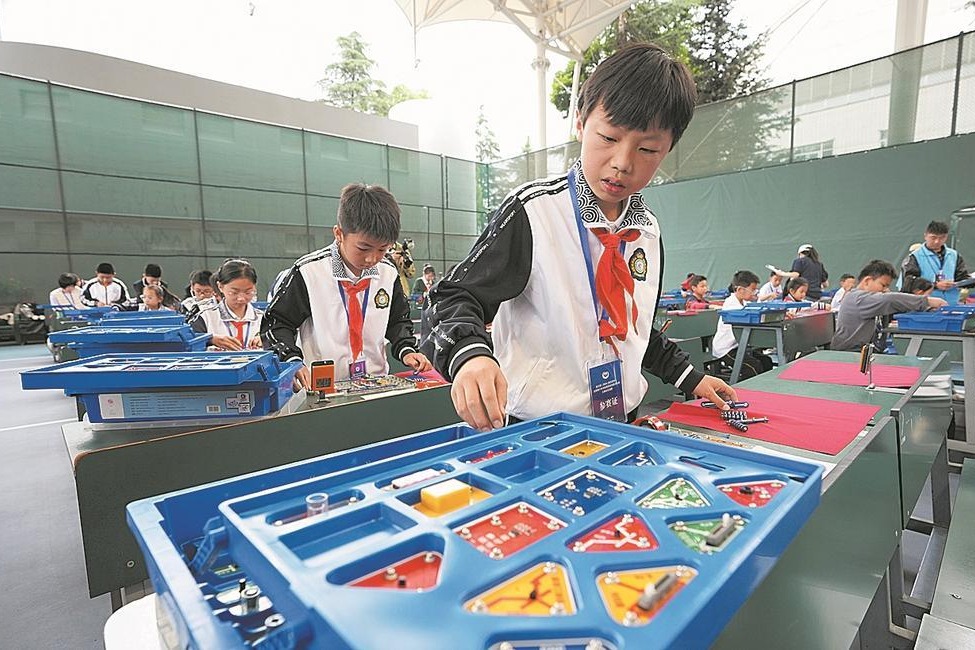BRI exchanges share healthcare expertise
Physicians from six countries take part in endoscopy training in Beijing

Despite the air conditioner being on full blast to counter the sweltering heat, sweat droplets lingered on the foreheads of doctors at a simulation facility in Beijing in June, as physician Mustafa Ahmed Haridy Abdellah slowly navigated an endoscope through the digestive tract of an anesthetized pig to identify a malignant lesion.
Observed by a team of physicians and interpreters, the 35-year-old Egyptian doctor had just taken over the device from Sergei Skupchenko, Abdellah's Russian peer, who had carefully threaded the endoscope into the pig. As Abdellah identified the lesion via a live feed, he delicately began to snip away to remove the infected tissue with millimeter precision.
Under the guidance of senior Chinese endoscopists, Abdellah completed the procedure, an act that was met with a hushed round of applause from the observing physicians, before collecting a specimen and handing over the controls.
For Abdellah, he'd never had to travel so far to practice such a procedure, but when he first heard about the opportunity, he jumped at it.
"I first took a train to Cairo, then a flight from Cairo to Dubai. I stayed at the airport for about three hours before getting on another flight to Beijing," he said. "It took me a total of 40 hours from my home to the operating room in Beijing.
"The only thing that made the long trip easier for me was knowing that I will be learning something new here," he said. "Now that I am here, I am truly happy to see these doctors and officers giving us the education."
Abdellah was among 16 physicians from six countries involved in the Belt and Road Initiative who participated in a five-day intensive training program from June 9 to 13 in Beijing. The doctors were from Iran, Egypt, Russia, Portugal, Thailand and the Philippines.
The event, the seventh Belt and Road International Advanced Gastrointestinal Endoscopology Seminar, focused on gastrointestinal endoscopy training — a minimally invasive procedure that allows doctors to examine the digestive tract and treat disorders, including early-stage cancers, using an endoscope.
It was jointly hosted by the Beijing Friendship Hospital affiliated to Capital Medical University, the National Clinical Research Center for Digestive Diseases and domestic medical equipment manufacturer SonoScape, headquartered in Shenzhen, Guangdong province.
Zhang Shutian, president of the hospital, said that through the program, foreign trainees progressed from computer simulations and mechanical models to animal-based practice and clinical training.
"Each workshop edition accepts no more than 20 international medical professionals to ensure hands-on experience for every participant," he said. "Our aim is to help junior endoscopists achieve proficiency in gastrointestinal endoscopy, while experienced practitioners can refine and standardize their techniques."
For Abdellah, the technique he was the most eager to learn was endoscopic submucosal dissection, or ESD. It is a minimally invasive procedure used to remove early-stage gastrointestinal tumors.
"I have seen many local cases of stomach and digestive system cancers in southern Egypt where I practice. This technique has great potential because it is cost-effective as it removes early-stage tumors without major surgery," he said.
However, Abdellah said only two or three physicians are trained in ESD in the region, and barely 30 such procedures are performed annually.
This scarcity of expertise prompted Abdellah's supervisor at his hospital to encourage him to participate in the training program, he added.
Wei Yongqiu, from the Beijing Friendship Hospital's gastroenterology department, was among the Chinese physicians mentoring international doctors in the program.
"We start by clarifying the very basics and then guide them through each fundamental step — from properly handling the endoscope and making precise incisions to fluid injection techniques — while highlighting common pitfalls to avoid," he said.
Wei said that some visiting physicians come from emergency or general surgery backgrounds, so their techniques with the equipment tend to be rougher and more rushed.
"Performing endoscopic procedures is like carving flowers on tofu as it demands meticulous precision and immense patience," he said. "So it is important to convey to them the delicate nature of the work.
"Whether practicing on ex vivo specimens or live animals, I always emphasize treating each exercise as if it were a real patient. This discipline prevents bad habits from forming," he added.
Aleksei Goriunov, a Russian doctor, said the way Chinese doctors teach them feels like "a grandma caring for her grandchild".
"This experience has exposed me to novel knowledge and I further understand the significance to never stop learning in our profession," he added.
Li Peng, vice-president of the hospital, said that since the program was launched in 2016, it has trained more than 100 medical professionals from over 10 countries involved in the Belt and Road Initiative.
Li recalled an Egyptian trainee from the 2019 program who spent over 10 hours each day practicing in the simulation lab, often working as late as 3 am.
"I have since met her at several international conferences and learned that she is now leading efforts to advance endoscopy training and awareness in Egypt," he said.
"Going forward, our hospital will emphasize standardized, foundational training while incorporating the latest innovations in digestive endoscopy," he added.
During his training session, Abdellah took nearly an hour to complete the ESD procedure successfully.
"Probably because I am very tall and the operating table was kind of low. So I had to keep bending over constantly, which made it extra challenging and difficult," he said.
"I definitely need more and more practice and experience to fully master the skill," he said. "But the program is a good starting point."


Today's Top News
- Xi encourages young sinologists to bridge China, the world
- Xi, president of Comoros exchange congratulations on 50th anniversary of ties
- Luxury leasing market gains traction in HK
- Historic games forge deeper bonds beyond podium
- Technology will ensure future heroes save lives and live
- Auto market rides high on NEV sales growth






























